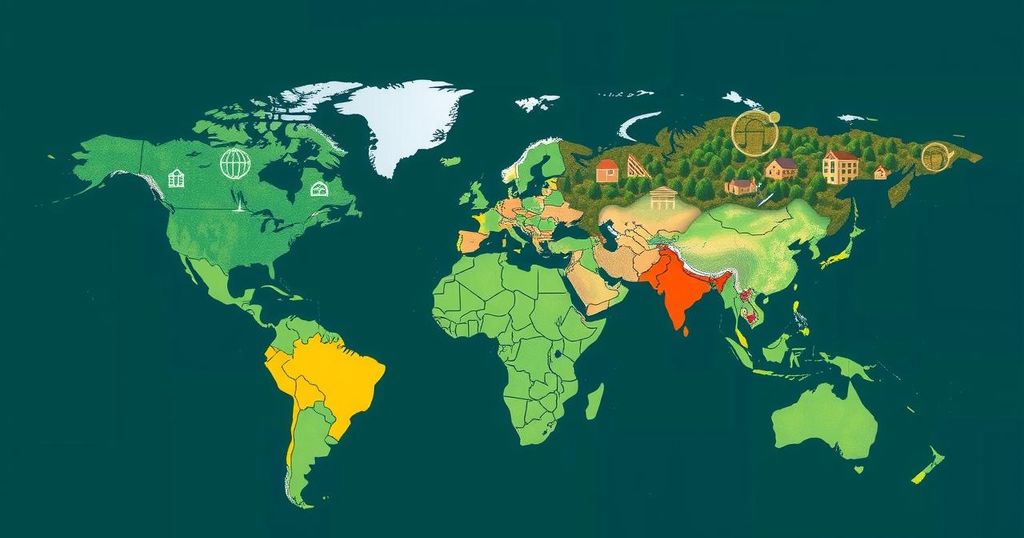A recent ASCOR study reveals that wealthy countries are inadequately addressing climate change, with insufficient national pledges for emissions reduction and low commitment to international climate financing. Legal actions against nations for failing to protect citizens from environmental threats highlight the urgent need for effective policies. Meanwhile, some nations are progressing towards sustainability goals, but overall, significant gaps remain in addressing climate risks.
Recent analyses indicate that wealthy nations are falling short in their commitments to combat climate change. The Assessing Sovereign Climate-related Opportunities and Risks Project (ASCOR) has revealed that the current national pledges regarding emissions cuts, assessed across 70 countries, do not align with the ambitious target of limiting global temperature rise to 1.5 degrees Celsius. This underperformance is alarming, especially as 2024 approaches, with the global temperature expected to hit unprecedented levels, thus amplifying the necessity for immediate action.
Investors in government debt, who are increasingly concerned about the financial impacts of climate change, are scrutinizing the responses of affluent countries to rising temperatures. Victoria Barron, Chief Sustainability Officer at GIB Asset Management and co-chair of ASCOR, emphasized the need for “more credible action by governments,” stating that investors require robust climate policies to justify capital flows. However, a significant concern persists that financial markets are not adequately pricing the risks associated with climate change, prompting research into the potential for a “climate-sovereign debt doom loop,” where countries may face increased costs linked to their climate-related challenges.
The acknowledgement of these challenges coincides with rising legal actions against nations accused of not safeguarding their populations from extreme weather events. Next month, the International Court of Justice will convene to address these issues. In addition, the appointment of a fracking executive to lead the U.S. Energy Department under President-elect Donald Trump raises additional skepticism regarding America’s dedication to climate initiatives, especially with the anticipated withdrawal from the Paris Agreement.
Despite these setbacks, a handful of nations—such as Costa Rica and Angola—are making notable progress toward achieving their climate targets. Nevertheless, the report highlights that fewer than 20 percent of countries have suspended approvals for new fossil fuel projects, and over 80 percent lack transparent commitments to phase out fossil-fuel subsidies. Furthermore, the commitment of wealthy nations to international climate financing remains inadequate, with the majority failing to meet their share of the $100 billion annual climate finance goal, expected to climb to $300 billion at the upcoming COP29 summit in Baku.
In a proactive move, ASCOR has expanded its framework of analysis from 25 to 70 countries to gather more comprehensive insights. Encouragingly, 40 nations now employ legal frameworks aimed at addressing climate change, and three-fourths have developed strategies for managing the associated physical risks, presenting a glimmer of hope amid widespread apprehension about the future of global climate commitments.
The ongoing dialogue surrounding climate change highlights a pressing need for accountability among wealthy nations concerning their environmental commitments. The ASCOR’s recent study sheds light on the alarming failure of affluent countries to adhere to their own pledges aimed at tackling emissions, particularly in the context of an impending global temperature rise. Understanding these findings necessitates an exploration of how climate change not only threatens the environment but also poses significant financial risks connected to sovereign debt and national policies.
This assessment by ASCOR underscores a critical juncture in global climate efforts, revealing that wealthy countries are not living up to their emissions reduction pledges essential for a sustainable future. With disparate commitments to climate financing and minimal actions towards ceasing fossil fuel expansion, the international community faces significant hurdles. However, the emergence of legal frameworks and plans for managing risks in a majority of nations provides a potential pathway for bolstered action in the face of an imminent climate crisis.
Original Source: www.outlookbusiness.com






